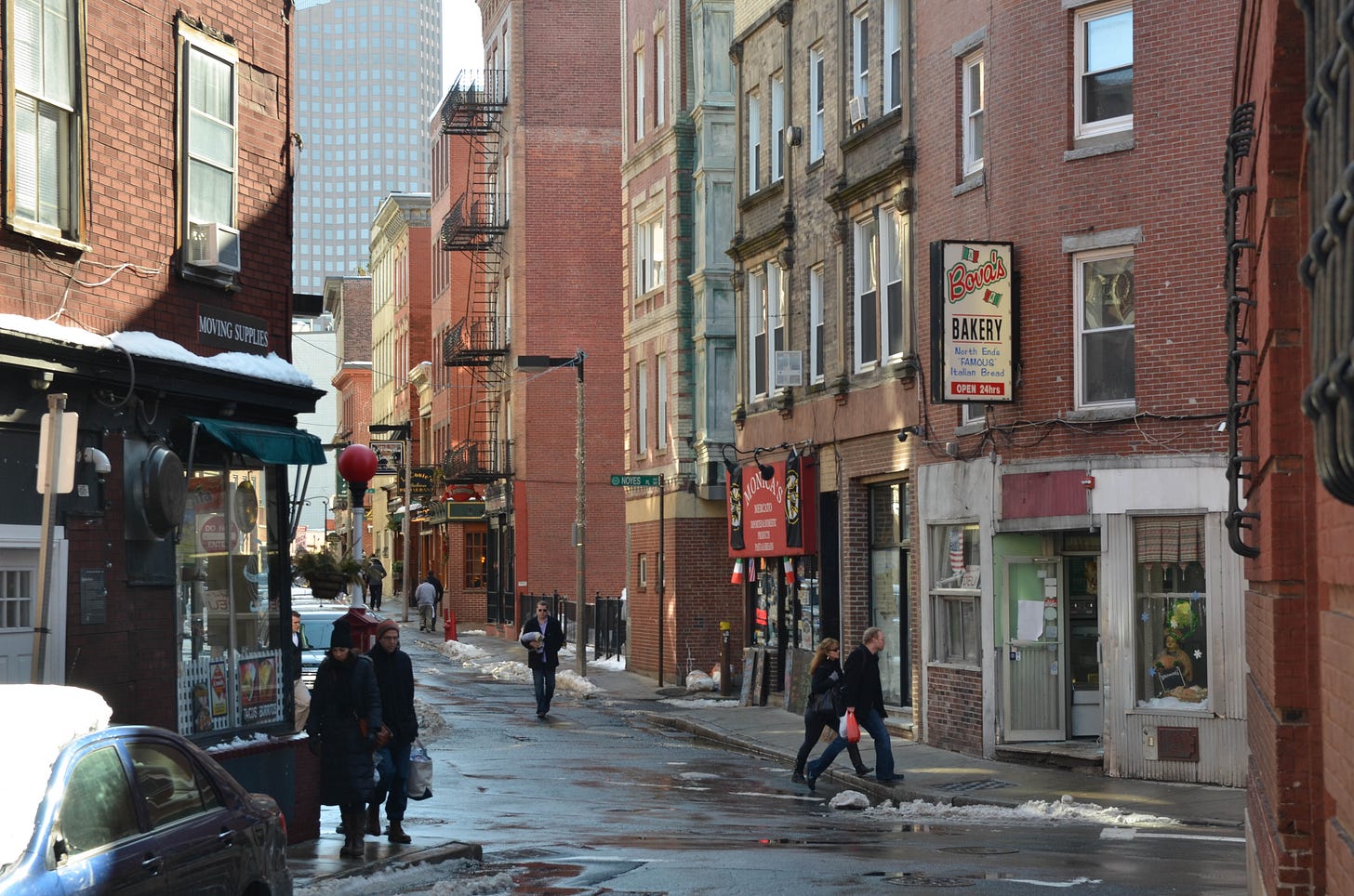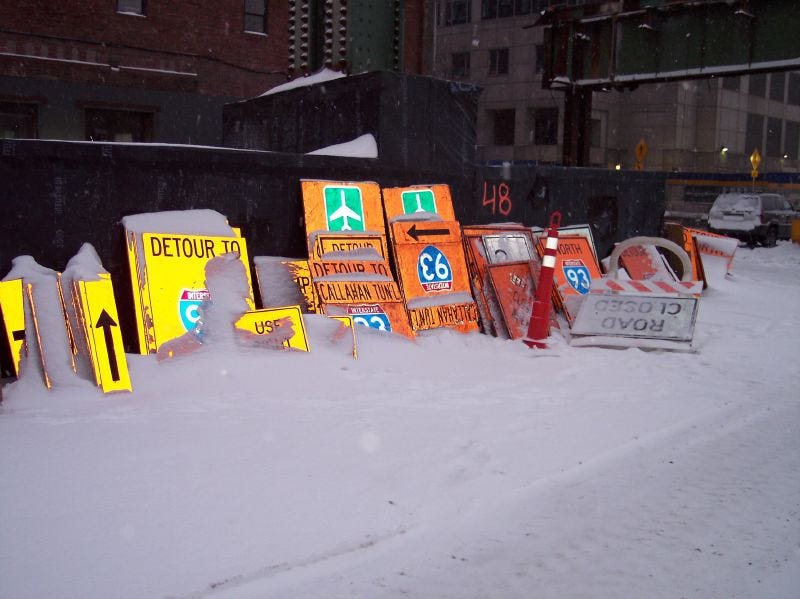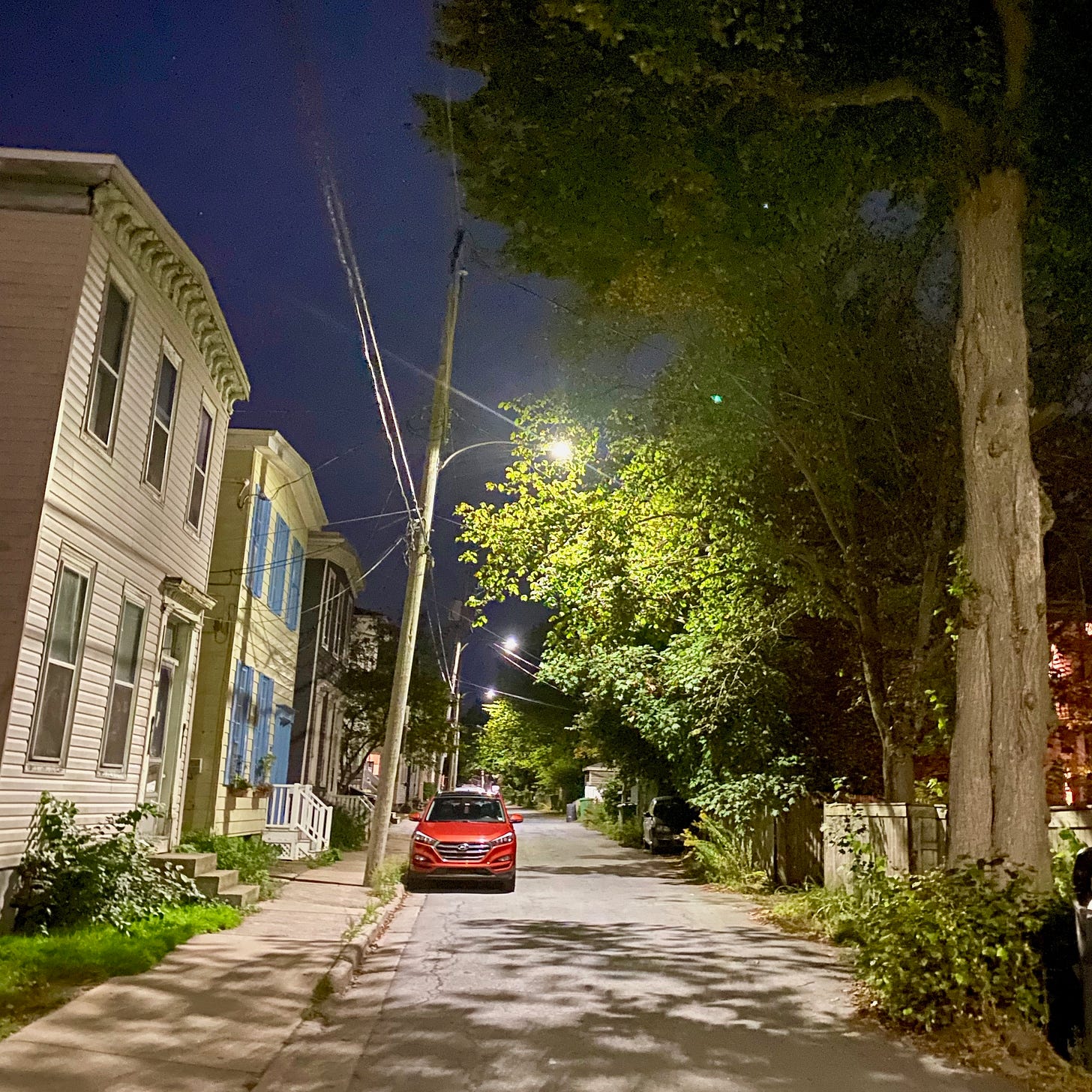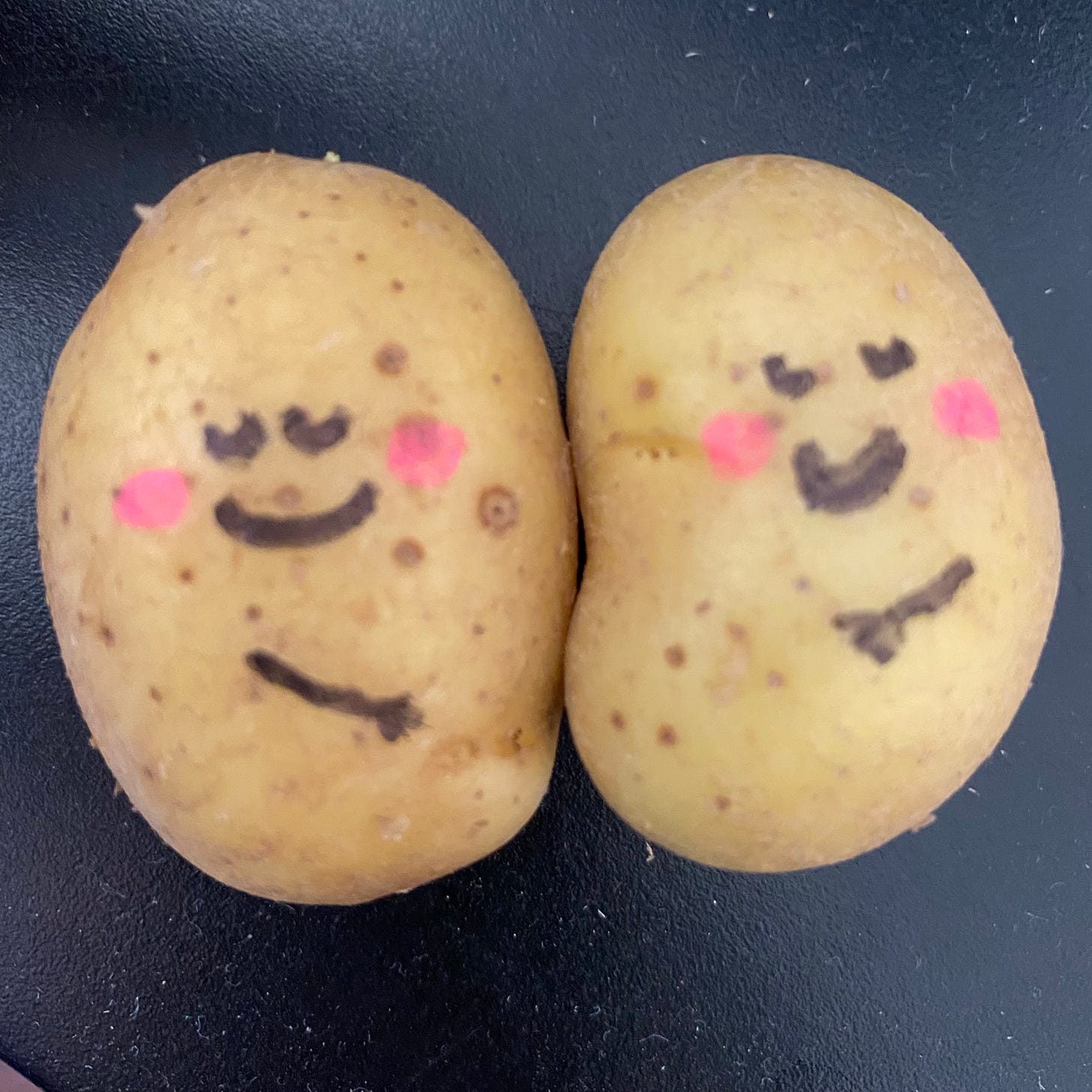From one North End to another
20 years' journey from a claustrophobic Little Italy to the cutest part of Halifax
Hey everyone. It’s been a few weeks, and so this is a long one. I’m embarking on my effort to write a bit more personally here, in the spirit of the title of this newsletter. Writing it out has always been one of my chief processing tools, particularly when I have a lot going on emotionally. So here goes; buckle up for a long one.
Content notes: mentions of alcohol overuse, situations of marginal consent, non-monogamy, and Boston’s Big Dig. (I’m only partly kidding.)
I woke up this morning in Halifax, Nova Scotia, in a sunny bedroom in the lovely little apartment I’ve been staying in since September 1. The apartment, an Air BnB place that had an immediate homey feel, is in the North End of the city—excuse me, “regional municipality,” as the strange quirk of this place would have it—and even before we came here, I couldn’t help but think about how, in September of 2002, I was moving out of a railroad apartment in the North End of Boston to embark on a different and exciting life.
<Sophia Petrillo> Picture it, the North End, 2002. </Sophia Petrillo>

I was living with a guy in a nice-enough place (though it lacked severely for doors) above Monica’s, a pizza place kitty-corner to Bova’s, the 24-hour bakery that wafted fresh-bread-smell through the cramped streets of Boston’s famed Italian neighborhood, tempering the wet-garbage-and-cigar-smoke tang. I was a few steps away from a monastery and its peaceful garden, locked behind an iron gate; Marcuccio’s, a lesser-known but excellent restaurant where I once had a stewed venison dish I can still remember the taste of; and all the pastry shops, trattorias, and Italian markets you wanted (and several you didn’t).
Most days I would walk up Salem Street toward the 20-year construction zone that was the Big Dig, through which my route would shift every few days as the workers chipped away at it. Toward the center of the city, to work or go to classes. At the graduate program I’m still paying for lo these 20 years later, I had made perhaps two friends. My boyfriend and I went out a lot to see shows, or just wander the bars and drink too many beers. But we never really met anyone. I was horrendously lonely, but that was also nothing new to me. I haven’t written very much about my early life in this space, but I was an exceedingly silent, fearful child and teenager, a young adult who tried brashness on for size but never quite grew into it, a virgin until age 20, and never truly in reciprocal love. Making friends was a halting process at best, and moving to a new city hadn’t made it easier.

In September 2002, I was finishing out nine months of continuing to live with my boyfriend, with whom I’d ostensibly broken up, though we mostly acted like people who were still dating but just fight all the time. I had discovered what we only called polyamory in those days, but which now comes in many names and flavors. If I had to honestly name, now, the thing I was doing then, I’d call it “backing slowly out of a bad relationship by starting a new one.” I had met and fallen in love with someone through one of the aforementioned grad school friends. Polyamory, thus far, had been a revelation, if a painful one. My almost-ex was definitely not into it, but also wasn’t above “enjoying what time we had” together before moving back to the West Coast, which mostly meant pressuring me for sex as compensation for not being mean to me. We finished out our lease and said our goodbyes. I wrote a poem called “Catalogue of a Divorce,” though we hadn’t been married; he was the first partner I’d lived with, and we’d been together for five years. I was 27 years old.
Leaving that airless tenement building that sweltered above the ceaseless saints’ processionals that packed the summer streets was a revelation, too. I started spending most of my time in Cambridge, Somerville, and Arlington, north of the city where there was more room to breathe, a seemingly limitless number of wonderful nerds and artists, and so much to learn about who I could be when I found the right people. For the first time in my life I felt loved, desired, and like I had come home. In many ways, it also felt like my life truly began the day I left the North End of Boston.
20 years have passed since then. 20 years of wild relationships, intense romances, an ill-fated marriage and intensely difficult divorce, long companionships with several really amazing people who have loved me deeply and taught me much. A career journey that took me through teaching and coaching and writing and finally to the four-year training program that would result in my certification as a Somatic Therapist, after which I limped along with a small practice for years until my divorce forced me to find more work, my career took a turn into the games industry, then to travel writing, then back to therapy work.
20 years and change, too, of living in the Boston area, to which I first moved in September, 1999. September, that most golden of months, is always transformation time in New England. In the first twelve years I lived in eight different places; from 2011 on, I lived in the house I still co-own with dear friends, though its history, too, is fraught, fragile.
The pandemic, of course, changed much. Just months in to having found the only full-time job I’d ever loved, the company made massive layoffs to save itself, and I found myself adrift in my search for new work. My wonderful therapist encouraged me, and suggested that I dedicate myself to my practice as a full-time endeavor. A longtime conflict with the house finally settled itself, though other conflicts emerged, and perhaps the fractures were already too much to fix. I helped start a mutual aid organization. And then, through that, the pandemic brought something else into my life, something that marked a turning point more profound than even that North End departure had.
It’s perhaps bad form to suggest that a partner coming into your life can change everything. But there is something magical about the way the last year and half has played out, since that day I brought a trash bag full of old clothes to his doorstep for the clothing drive he was organizing. We looked at each other over our masks, me wearing a long down coat, him a respirator worthy of Mad Max and a t-shirt that read “everyone loves someone who had an abortion.” He remembers me tilting my head to the side; I remember that too, the “huh” of recognition, the strange feeling of momentousness in an ordinary meeting. We haven’t stopped speaking our truths to one another since.
We have encouraged each other’s growth and healing so much in the time we’ve been together. “Traumatized people massacre each other,” he told me early on, and we have done everything possible to avoid that eventuality, though we’re far from perfect at it. Still, he’s taught me so much that I’ve been able to apply to my own healing, as well as to helping my clients. In turn, I know I’ve helped him open long-closed places in himself. Somewhere along the line we began to recognize that the truths we were speaking included a deep desire, even a need, to be number one to each other. And so, over the course of this year, we’ve made that a reality.
Going to try out living in Canada has more to do with that reality than may be initially apparent.
Just as in September 2002 it was time for me to leave the North End in Boston for a more expansive life, in September 2022 it was time for me to head very far north indeed, to the North End in Halifax. Granted, I’m only here for a month, and I’ll be visiting other Canadian cities throughout the rest of this year. But it would be ridiculous for me to pretend that I’m not doing this in part because living in Boston wasn’t really working for me anymore.
Most of the things I loved about living there—where “there” is the place that locals used to call “Camberville,” but which has expanded to something like Cambervillingfordmaltham as both Cambridge and Somerville became untouchably expensive—are gone. My favorite cafe closed years ago; the one I migrated to has changed its look, character, and coffee completely. The restaurants and bars I loved most have closed one by one, some before the pandemic, some after. The neighborhoods I treasured have been gentrified and/or corporatized out of all recognition. The fringe theatre scene, always small and struggling in the Boston area due to lack of support and space, is struggling even harder in the wake of scandals, space closures, and of course, the pandemic.
The house I still co-own is in a strange limbo, the original dream of its founding long shattered. Perhaps it can be revived in some form, but it doesn’t feel like it. My romantic relationships have been ended or dialed down as I focus in on my newer partner. My desire for non-monogamy has waned considerably, and I don’t know if it will return. I don’t know if it’s right for me anymore.
There’s a handful of very special people to me, who, if I do move, I hope not to lose touch with, and will endeavor not to. I have some small faith in myself in this regard: I have managed to keep in touch with people important to me, whether in Colorado, Louisiana, Minneapolis, or Texas. I’ve not been perfect, mind; there are folks I’ve fallen out of touch with and wish I hadn’t. But I’d like to think I’d keep up with people. I might even be able to believe that people will want to keep up with me.
I don’t know how I’ll feel about Ottawa, or Montreal, or Quebec City. But just at this moment, two weeks into my stay in Halifax, I must sing the praises of its North End: local food abounding, square saltbox houses in all colors, pride flags painted on crosswalks, young people of all descriptions walking everywhere, a Fringe Festival happening as we speak, art seeming to spill from every corner. It’s required that households compost here, and separate recycling. Every single time I need to throw something out, I have to think about whether it can be used again, and where it’s going to end up. Nearly every time I go to a cafe or open a website about a place or event in this town, I see the land acknowledgment to the Mi’kmaq people, and an understanding that reparations are necessary.
It seems to be a larger cultural thing that Canadians, in general, are more civic-minded than Americans. A server at the place I went to the other night told me that there were plenty of people here who didn’t like the mask mandates, for example, but they still wore the freaking masks because other people matter, or something. There’s a sense I have here that people actually care about each other, or at the very least understand that we need one another to survive. My partner has also pointed out the intense difference between the languages of the countries’ founding documents: Life, Liberty, and the Pursuit of Happiness, versus Peace, Order, and Good Government.
On a more local level, there’s a thing that can happen when a place is hell-and-gone from anywhere, which Nova Scotia is. In Halifax, people recognize that they have to take care of each other, and that they have to be self-contained. Clearly, at some point, Haligonians decided that if you want something cool, you have to bring it here, make it here, or nurture its growth, here. I had heard that Halifax was a very cool and cute small city. I had no idea how true that would be.
Nearly two weeks in, I’m attempting to slow down a little. Sometimes, simplifying your life can take a lot of work. My partner and I worked hard to get here, scrambled, stressed ourselves out. Since we’ve been here, I’ve been dragging him hither and yon, trying to see things and meet people and convince myself, as he pointed out, that I won’t be lonely here if we move.
But the hardest lesson of all, that I still haven’t learned after 20 years, is just to be here. To trust in the one person I’ve chosen, to be present in the depth of that. To enjoy living in the place I currently am, to feel the sense of living here, not visiting. We’re not here to find out whether there are enough cultural events and nice restaurants to keep us happy. We’re here to see how it feels.
Slowing down means I see what it’s like to stop and feel my feelings, and to share them candidly with the person I promised to do that with. Slowing down means sometimes I experience discomfort, and I try not to dissociate from it with distractions, alcohol, food, or shiny new people. Slowing down means making the space, and the time, at last, at last, to have it out with myself.
I’m not trying to suggest that the 20 years between that mid-Big-Dig North End and this even more northern one were nothing but running from myself. I was running for myself, toward myself, when I could. But I was often running, or when I wasn’t, I was collapsed, mired. I’ve had so many incredible experiences and loving partnerships that have made me who I am. I’ve made mistakes and had my heart broken many times over. I’ve learned so much.
But after all this time, I might just be learning to live.




